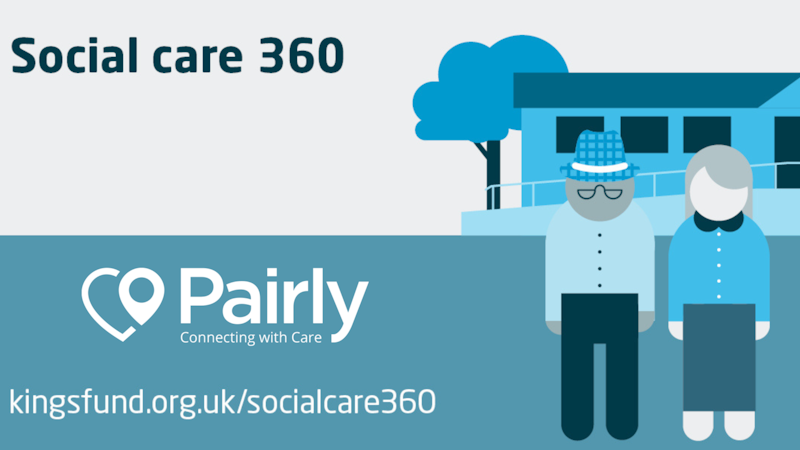
Social care in England is facing some significant challenges.
The social care system, everyone knows it’s broken” - Bill and Jo Wilson, bbc.co.uk
At Pairly, we know keeping up with current trends is important. The findings of the Social Care 360 report are an interesting read. We looked at some key trends affecting the care sector today, considering how they could impact adult social care and how Pairly is part of the solution.
Some of the current key trends in Adult Social Care
Requests for Support Are Increasing
One of the key trends highlighted in the report is the increasing number of people, particularly working-age adults, requesting support. This trend is likely due to an ageing population and the impact of the pandemic on people's health and wellbeing. The increase of people needing care will put a lot of pressure on the care sector to meet demand; it will also highlight the importance of early intervention and prevention via the NHS and social services to reduce the need for long-term care.
Pairly simplifies the search for care, reducing hours to minutes. It is being used in NHS hospital discharge and at local authority level to find care for patients: “We were looking for care for over three months.. You were professional and helpful. I was delighted you made a match” -Care Seeker, Somerset
Total Expenditure Has Increased
Total expenditure on social care has increased due to the impact of the pandemic. While this is good news for the sector, it does highlight the pressure that social care is under and the need for increased investment.
Pairly can reduce costs for local authorities by saving hours. We calculated that finding a care connection costs, on average, just 57 pence in staff time
Local Authorities Are Paying More for Care
Local authorities are paying more for care home places and home care. This suggests that the cost of providing care is rising and that more needs to be done to ensure that care is affordable and accessible to those who need it. The decline in the number of care home places and the high staff vacancy rate also indicate potential challenges in meeting the growing demand for care.
Pairly allows the seeker to get a clear overview of the cost of care from various sources regardless of how their care is funded, giving transparency and allowing the seeker to find the correct level of care for the right price.
Quality Is Largely Stable, but Ratings Are Down
The quality of social care is largely stable, but fewer ratings were published during the pandemic. This makes it difficult to assess the quality of care being provided and highlights the need for more data and transparency in the sector. This may make it more difficult for people to make informed decisions about the quality of care they receive.
Pairly connects care seekers with providers by giving them an overview of the worker or company and providing them with access to CQC ratings and the opportunity to compare providers instantly in an easy-to-read format.
Personalisation Is Declining, and Satisfaction Is Edging Downward
Fewer people receive direct payments, which suggests that personalisation is declining. Personalisation is important as it allows people to have greater control over the care they receive, and it is essential for ensuring that care is tailored to individual needs.
The satisfaction of people using services is edging downward. This highlights the need for improvements in the quality of care and the need for greater investment in the sector. More needs to be done to ensure that care is person-centred and meets the needs and preferences of those who use social care services.
Pairly gives power to the care seeker through transparency and supporting their research. By harnessing the power of data, Pairly gives care seekers unrivalled access to the care services they need in just 5 clicks.
What needs to change?
The Social Care 360 report highlights the significant challenges facing the care sector in England. It is clear that more needs to be done to ensure that those who need care receive the support they require.
The key trends in adult social care highlight the need for ongoing investment and reform to ensure that the care sector can meet the needs of an ageing population with increasingly complex needs.
The government must take action to increase investment in the sector, improve working conditions for care workers, and ensure that care is affordable and accessible to all. The care sector is essential for supporting some of the most vulnerable people in society, and it is essential that it is given the support it needs.
Pairly is part of the solution
According to a recent Ipsos survey, 40% of those seeking care found the process to be distressing. As the demand for care continues to rise, it's essential to make the search for care
easier. That's where Pairly comes in - the first platform of its kind in the uk that connects care seekers with available live care capacity.
Pairly.com is the first UK online care capacity aggregator, it includes care homes, live-in care, home care and private care assistants.
Pairly was founded by Will and Mark, two health and social care professionals with a combined 20 years of experience running successful CQC-rated 'outstanding' care businesses. Their goal is to improve the lives of vulnerable people in their communities and make care better for everyone.
The Social Care 360 Report is an annual report that draws on publicly available data and provides a comprehensive overview of the state of adult social care. While there are gaps in the data, it offers insights into the challenges faced by the sector.
